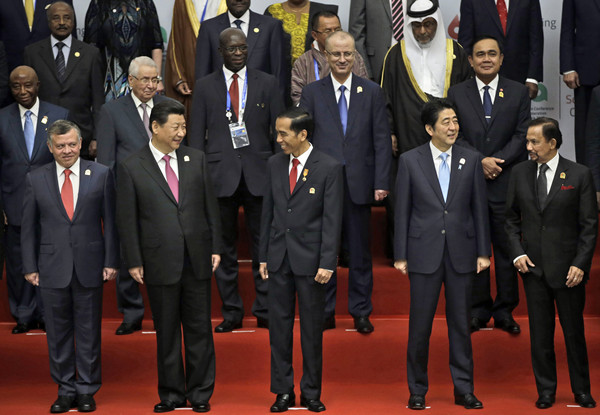Bandung Spirit acquires new vitality
Updated: 2015-04-24 07:49
By Zheng Xiwen(China Daily)
|
||||||||
 |
|
Front row from left to right, Jordan's King Abdullah II, President Xi Jinping, Indonesia's President Joko Widodo, Japan's Prime Minister Shinzo Abe and Brunei's Sultan Hassanal Bolkiah prepare for a group photo during the Asian African Summit in Jakarta, Indonesia, on Wednesday. DITA ALANGKARA / ASSOCIATED PRESS |
Twenty-nine Asian and African countries, including China, participated in the first Asian-African Conference, organized by Indonesia, Myanmar, Pakistan, Sri Lanka and India in Bandung, Indonesia, 60 years ago. The conference, also called the Bandung Conference, was the first gathering of Asian and African people to protect their newly earned independence and maintain world peace. It was also their first large-scale meeting free from Western factors.
The "solidarity, friendship and cooperation" (or the "Bandung Spirit") developed at the conference have strengthened the national liberation movements of Asian and African people and guided them to pursue solidarity and cooperation. The Bandung Spirit has also powered humankind's fight for good causes.
After 60 years, Asian and African leaders and representatives have gathered again in Bandung to negotiate friendly cooperation, development and discuss issues of common concern. Their meeting is expected to inject more power into the "colossal ship" of Asian-African cooperation.
Given the changes in the world order, Asian-African cooperation today goes beyond the geographic scope and is of even more global significance. Aside from being the cradles of civilization, Asia and Africa account for more than half of the United Nations member states and are home to three quarters of the world's population. With a third of world's economic output, Asian as well as African countries are now at a crucial stage of development and moving toward a better future.
These similarities have made it necessary and possible for Asian and African countries to develop a common security and crisis perspective, and help each other on the basis of reciprocity and mutual benefit to seek common development. As good partners, Asian and African countries should pursue common grounds by shelving their differences and forging a new and broader pattern for multi-layer and all-round cooperation.
Cooperation between Asian and African countries will set a good example for broader South-South bonding. Since the rise of emerging markets and developing countries will create new opportunities for South-South cooperation, Asian and African countries should consolidate their relations and deepen their cooperation with developing countries in Latin America and the South Pacific region using the Non-Aligned Movement and Group of 77 mechanisms.
They should also use the Conference on Interaction and Confidence Building Measures in Asia and the BRICS platform to establish a new framework for South-South cooperation in order to increase the representation of and give more say to developing countries in global mechanisms and better safeguard their rights and interests.
Aside from carrying forward the Bandung Spirit, the cooperation between Asian and African countries will also promote South-North cooperation. Asian and African countries should take the lead in advocating mutual respect, stick to the new "common, comprehensive, cooperative and sustainable" security outlook, and urge developed countries to help the developing ones boost development and narrow the South-North gap so that a more balanced and new type of global partnership between developed and developing countries can be established.
China has been pushing forward Asian-African cooperation and is committed to safeguarding peace and stability in Asia and Africa. As a reliable friend of developing countries, China is also committed to promoting solidarity and cooperation among Asian and African countries.
Sixty years after the Bandung Conference, Asian and African countries have started a new journey of cooperation. The fruitful cooperation between Asian and African countries in the past will boost their confidence and lead them toward a better future.
Just as President Xi Jinping said to commemorate the Bandung Conference, the Bandung Spirit is not outdated; instead, it will acquire new and strong vitality. In this spirit, Asian and African countries should work together to build a brighter future for their peoples and those in other parts of the world.
The author is a Beijing-based scholar of international relations.
- Global health entering new era: WHO chief
- Brazil's planning minister steps aside after recordings revelation
- Vietnam, US adopt joint statement on advancing comprehensive partnership
- European border closures 'inhumane': UN refugee agency
- Japan's foreign minister calls A-bombings extremely regrettable
- Fukushima impact unprecedented for oceans: US expert

 Stars of Lijiang River: Elderly brothers with white beards
Stars of Lijiang River: Elderly brothers with white beards
 Wealthy Chinese children paying money to learn British manners
Wealthy Chinese children paying money to learn British manners
 Military-style wedding: Fighter jets, grooms in dashing uniforms
Military-style wedding: Fighter jets, grooms in dashing uniforms
 Striking photos around the world: May 16 - May 22
Striking photos around the world: May 16 - May 22
 Robots help elderly in nursing home in east China
Robots help elderly in nursing home in east China
 Hanging in the air: Chongqing holds rescue drill
Hanging in the air: Chongqing holds rescue drill
 2.1-ton tofu finishes in two hours in central China
2.1-ton tofu finishes in two hours in central China
 Six things you may not know about Grain Buds
Six things you may not know about Grain Buds
Most Viewed
Editor's Picks

|

|

|

|

|

|
Today's Top News
Liang avoids jail in shooting death
China's finance minister addresses ratings downgrade
Duke alumni visit Chinese Embassy
Marriott unlikely to top Anbang offer for Starwood: Observers
Chinese biopharma debuts on Nasdaq
What ends Jeb Bush's White House hopes
Investigation for Nicolas's campaign
Will US-ASEAN meeting be good for region?
US Weekly

|

|









